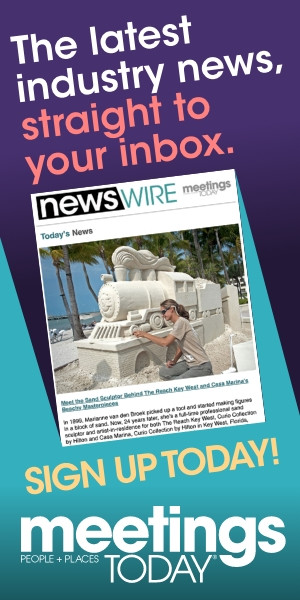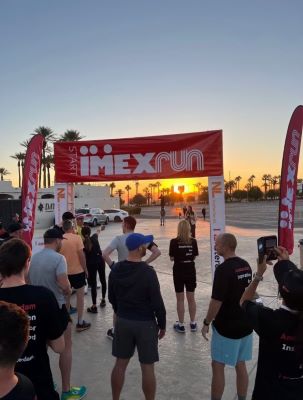Sep 10, 2024
6 Meetings Industry Professionals Share Tips for Practicing Wellness While Traveling

We say it quite a bit, but we only repeat ourselves because it’s true: Wellness looks different for everyone.
Plus, with the rapidly evolving wellness space frequently introducing new concepts, trends and practices, the scope of what’s considered wellness is always expanding, giving us even more to consider when it comes to how we take care of ourselves physically and mentally.
These wellness-related developments and conversations can be overwhelming to keep up with, but they have also made it a bit easier to prioritize self-care by introducing us to new practices and techniques to try—and reminding us that we’re not alone in the challenge of figuring out how to make wellness a part of our daily routine.
The reality of being a meetings and events industry professional makes sticking to any type of consistent routine a challenge, though. Our lives are endlessly interrupted by travel, and even if wellness comes easy at home, figuring out how to continue taking care of ourselves while on the road can be a real obstacle.
No matter how we practice self-care while traveling, as meetings professionals, we all have the same end goal: Be our best self so we can do our best work.
For anyone struggling with prioritizing your well-being while traveling for meetings and events, we spoke with six industry friends about their on-the-go wellness routines for inspiration.
[Related: 8 Hospitality Industry Professionals Share Tips for Managing Stress]
How do you prioritize your well-being while traveling for work?
Nolan Nichols, Founder & Keynote Speaker, A Million Dreams

“I can’t emphasize enough how important it is to prioritize your well-being while traveling. Travel can be challenging, and taking care of yourself not only benefits you, but also elevates your ability to bring out the best version of yourself to those around you.
I approach well-being with three key strategies: plan, posture and pace.
First, I’ll take a look at the event schedule and figure out the moments of wellness that I can plan for, such as physical exercise or eating healthy. Secondly, I’ll posture myself so that I’m self-aware enough to recognize the hidden moments of wellness happening throughout the day, such as a shared conversation with a colleague, meeting a new friend or reflecting on special moments that took place. Lastly, I want to pace myself and know that traveling for events can feel like a marathon at times, but I want to design my wellness activity for consistency more than intensity.”
Danielle LeBreck, Senior Content Director, Meetings Today
“I’ve been a competitive runner for most of my life, so chances are, when I’m on the road, I’m training for a race and have to find time to squeeze a run in. But even if a race isn’t on my calendar, running has always been a consistent part of my daily routine—and it’s also my biggest stress reliever. So, I find, when traveling, a simple 30-minute jog before I start work for the day is grounding, puts me in a positive mindset and sets me up for success for the rest of the day. It keeps my focus on my well-being on track.
Plus, I’ve found over the years that running and/or walking is also a great way to explore a new place—another thing that brings me joy! From running at sunrise along the ocean in Perth, Australia, to jogging with 100 other conventioneers along the Las Vegas Strip at IMEX America during the annual organized IMEX Run, I’ve seen some pretty incredible sights on foot on work trips!”
[Related: 4 Ways to Incorporate Wellness Into Your Next Meeting or Event]
What are your strategies for maintaining a healthy diet while traveling for meetings and events?

Pandit Dasa, CEO, Work Mindful Corp. and Keynote Speaker on Mental Health, Mindfulness and Workplace Culture
“I try to pack sandwiches and healthy snacks when I head out for events. Anything I take from home and whip up myself is going to be a lot healthier than outside food. It’s also going to be cheaper than buying food at an airport. In general, I maintain a plant-based, vegetarian diet which keeps my body feeling a little lighter. This does get challenging at conferences where hotel staff may not always be prepared to accommodate a plant-based diet. For this reason, I plan ahead and see what I can eat and where. Oftentimes, planners will ensure I get meals according to my diet and for this I am very grateful.”
Lee Papa, Mindfulness & Well-being Speaker Trainer, Coach, Author and Creator of the Mindfulness Lounge for the Meetings and Events Industry
“It has been a progression of learning what foods make me feel low energy, listless or icky and then testing them. If my gut is off or my energy is low, I immediately look to the food. I start my day with LIVEDEN green superfood, which has changed my health for the better in so many ways. I then do not eat breakfast as I have flooded my body with tons of nutrients and am not hungry until late morning (I’ll have a snack or power bar—but watch the sugar in these!). Water, water and water. In my Mindfulness Lounge programs, I request an infused water setup, which promotes the intake for the attendees.
For the most part I am gluten-, sugar- and alcohol-free. If I choose to veer off course, that is a choice that I own, but I know it is not optimal and my body tells me by not feeling my best.”
[Related: 5 Tips for Eating Healthy on the Road]

Do you have an "on-the-go" workout routine? If so, what does this look like?
Nolan Nichols

“Travel and event schedules can be hectic, but I’ve discovered some enjoyable workouts that I can mix and match based on the event locations and the time I have available:
- Take the long way: When I can't fit in a workout during the day, I make up for it by increasing my steps. For instance, if there are free shuttles from the convention center to the hotel and it's less than a 25-minute walk, I'll skip the shuttle and walk instead. If I need to move between rooms at the convention center, I intentionally seek the longest route to boost my step count. Opting for stairs over elevators is another great way to add movement. In a world designed for convenience, you'll be amazed at how many extra steps you can accumulate by always choosing the longer path.
- Hotel room workouts: Even if the hotel gym is open 24/7, it can be tough to find time to get there during a busy day. Instead, I do push-ups, planks and sit-ups right in my hotel room. Just a few of these exercises can make a difference, and they offer a quick and easy way to fit in a short workout at the beginning, middle or end of your day.
- Outdoor activities: I like to include at least one outdoor activity during my trips, usually at the start or end. Doing it at the end gives me something to look forward to, while starting with it sets a positive tone for the rest of the trip. Once the event is in full swing, it can be more challenging to fit these activities in. My two favorites are running and paddleboarding. Running is a great way to explore the area while getting some exercise. Paddleboarding is another favorite, especially since many event locations are near bodies of water. I search for nearby paddleboard or kayak rental shops and schedule some time to enjoy the water. It's both a soothing experience and a fantastic workout, and I usually do it on the least busy day of my trip since it takes a bit more time than a run.”
Danielle LeBreck
“If I’m in a location where I feel comfortable running outdoors alone, one of my first questions upon checking into a hotel is to ask the front desk about safe running routes nearby. If I opt to use the fitness center, I make sure to double-check the opening hours and get in there first thing in the morning. (Have you ever tried going for a run on the treadmill after walking a tradeshow floor all day? I would not advise!)
If I’m in a huge rush but still want to get some movement in, I love using the Peloton app on my phone. The workouts from the app that require no equipment, like HIIT, strength, yoga or pilates classes, can be as short as 10 minutes and are easy to do in the hotel room.”
[Related: 4 Easy and Fast Ways to Stay Active During Meetings and Events]
How do you ensure you get enough sleep during hectic travel schedules? Or, how do you handle jet lag and adjust to different time zones effectively?

Sepideh Eivazi, Founder, Dawn of the Earth
- Choose the right flight: I opt for flights that arrive in the early evening so I can go to bed at a normal local time.
- Stay hydrated: I drink plenty of water to avoid dehydration, which can exacerbate jet lag.
- Sleep on the plane: If I’ll be arriving in the morning, I try to get some sleep on the flight. I bring a neck pillow, earplugs and an eye mask to make resting easier.
- Get sunlight: Upon arrival, exposure to natural light helps reset my internal clock. I spend time outdoors during daylight hours.
- Stay awake until local bedtime: Even if I’m tired, I try to stay awake until a reasonable local bedtime to sync with the new time zone.
- Short naps: If I'm really struggling, a 20- to 30-minute nap can help, but I avoid long naps as they can disrupt my adjustment.
- …and I always carry this magical travel kit from biocol labs.”
David T. Stevens, Wellness Architect, Olympian Meeting
“If I am flying east, I will always take the earliest flight out. Not only does it essentially put you in that time zone, it also usually avoids delays as the plane is already there. As for jet lag, the best thing you can do is get outside when you land and spend as much time as you can in sunlight to help your body’s circadian rhythm reset. I also do a workout after I land and get to the hotel, too. Not a hard one, just some movement. Or I will go for a walk in my destination.”
[Related: Tips and Tricks for Combating Jet Lag and Business Travel Fatigue]
How do you manage stress during busy event seasons when travel and work demands are high?
Nolan Nichols
“It’s crucial to stay grounded and self-aware, especially when navigating the stress of events and travel. If you're not taking care of yourself, it’s like trying to sail through rough seas with a leaking boat. Here are some strategies that help me manage stress:
- The Power of music: Numerous studies highlight the benefits of positive music. I often listen to music on my AirPods while walking to and from the meeting space or convention center. This helps me focus and decompress, allowing me to release stress through both walking and music.
- Morning meditation: Spending just five minutes in the morning with silence or light background music in your hotel room can significantly reduce stress and set a positive tone for the day. It helps me start the day with renewed energy and enthusiasm.
- Just breathe: When the day gets hectic, sometimes all it takes is a short walk down the hallway to refill my water bottle while taking deep breaths. This simple practice helps me center my mind so that I don’t let a bad moment ruin a good day.”

Pandit Dasa
“I have a daily meditation and mindfulness routine that I can’t live without. I picked up this wonderful habit during my 15 years in the monastery. While food feeds and nourishes the body, I consider meditation as the breakfast for the mind and soul. This can be practiced in the back of an Uber, in hotels, on the plane, at the airport during lengthy layovers, and it’s an absolute must for me before going up on stage to deliver my speech. Since mindfulness and mental health is something I talk about, it’s important for me to practice what I preach.”
Sepideh Eivazi
- “Create a stress-free zone: Carry a small item that brings you comfort. I like to carry a scented sachet, Dawn of the Earth lavender bags and palo santo, or one of my favorite books. I set it up in my hotel room or workspace to create a calming environment.
- Breathwork on the go: I practice quick, effective breathwork techniques like the 4-7-8 method (inhale for four seconds, hold for seven, exhale for eight) whenever I feel overwhelmed. As a somatic breathwork practitioner, I understand the importance of nervous system regulation and taking frequent breath breaks to ensure I am operating from a regulated state of emotions.
- Travel tea ritual: I bring Dawn of the Earth mid-day herbal tea with me. Taking time to brew and sip a cup can become a grounding ritual no matter where I am.
- Essential oils: I use a roll-on essential oil blend that I can apply to my wrists or temples. Scents like lavender, eucalyptus or citrus can help calm or energize.
- Dance it out: Sometimes, I take a few minutes to dance around my hotel room to my favorite music. It’s a fun way to shake off stress and boost my mood.
- Walking meditations: Instead of a traditional seated meditation, I try a walking meditation. I focus on each step and my surroundings to stay present and calm.”
Lee Papa
“Being in mindful practice removes you from the pattern of ‘just getting through’ and notions of conquering and achieving. It is a mindset shift that keeps you centered and deliberate in your health and well-being, mind, body and spirit.
I coined the phrase when I first engaged with the meetings and events industry in 2014, ‘Stress is not a badge of honor, nor is it a requirement to get the job done.’ It is a choice. It is a mental program. We must make small incremental changes daily, and then those become our new healthier patterns and programs.”
[Related: 8 Tips and Trends for Well-Being During Group Business Travel]
How do you maintain your mental health and avoid burnout in a high-pressure industry requiring frequent travel like meetings and events?
Pandit Dasa
“A lot of mental health is about mindset. I know I am doing everything I can but there are many factors that are completely out of my control. When things don’t go right and delays are taking place, I remind myself that I can’t stress over things I can’t control. This is easier said than done but it definitely helps to keep things and life in perspective. This is a message I remind my audiences of during the five-minute guided meditation I do toward the end of my speeches. This perspective can lighten the pressure people are carrying around and makes their conference experience more pleasant.”
Nolan Nichols
“The meetings and events industry can take you to some amazing places, but spending so much time on the road means missing out on family, friends and other important moments back home. Combined with the pressures of the industry, it can be a challenging mix.
To counterbalance this, I look for ways to use events to increase my well-being routine. For example, if I find myself with an unexpected 10-minute break, I might use that time for a walk while calling a friend or sending a text message saying I’m thinking of them. This allows me to make a personal connection that I might have otherwise not made. If I'm in an area where a friend lives, I might arrange to have dinner with them. Or, if I'm in a particularly interesting destination, I may invite a friend or family member to join me on the trip.
I actively seek ways for travel to enhance my life rather than detract from it. Often, this includes involving others in my journey, which not only enriches my experience but also allows friends and family to share in the adventure.”
Sepideh Eivazi
“Maintaining mental health and avoiding burnout in a high-pressure industry with frequent travel, like meetings and events, requires a thoughtful balance of self-care, time management and boundary setting. It's important to make mental health a priority by regularly checking in with myself to assess my emotional state and addressing any signs of stress or overwhelm early on.
Setting clear boundaries between work and personal time is essential, especially when I am on the road. This might mean being intentional about disconnecting from work emails and calls after a certain hour or learning to say no to additional tasks that could stretch me too thin. Protecting my energy and focusing on what's manageable helps maintain balance and prevent burnout.

Effective scheduling is another key element. I avoid cramming my calendar with back-to-back events or meetings without sufficient breaks in between. It's important to pace myself, ensuring that I have downtime to rest and recharge between trips. Grouping similar tasks together can also streamline my workflow, reducing the mental strain of constantly switching gears.”
David T. Stevens
“This is a marathon, not a sprint—and that’s the mindset that helps. I've never even gotten close to burnout, to be honest. I set boundaries and enforce them. I prioritize my own health over anything else. If someone asks for something additional of me that I know would require me to work nights or weekends, I will say no. (Yes, even in the corporate world when I was building a team and a department to service the entirety of the company.) However, I would say yes to the requester and then go to my boss to let them know the demand for our services was growing and I was going to need help. I would leverage contractors or professional services to be more efficient in the moment until the headcount was approved. TALK TO YOUR MANAGER! Share your stress, workload capacity and if you are doing too much! They are there to help, and if they aren't, LEAVE.”
[Related: Practicing Breathwork, Choosing Authenticity and Honoring Your Future Self]
Can you describe any personal rituals or routines you follow to stay centered and positive while traveling?
Pandit Dasa
“I do a lot of walking at airports during layovers. I do this to stay active since I know I am going to be doing quite a bit of sitting while on a plane or a taxi. I also like to walk around the area the hotel is in. Walking and exploring new areas helps free my mind and provides fresh perspectives which helps my mental health.”
Nolan Nichols
“One practice that has been beneficial for me is the GLADS exercise at the end of each day. I reflect on what I was Grateful for, what I Learned, what I Accomplished, what I Delighted in and what Scared me, but I pushed through. This reflection helps me gain perspective and see the bigger picture, allowing me to end the day feeling that traveling for meetings and events is enhancing my life rather than hindering it.”
David T. Stevens
“Know that if something goes wrong during travel, the people you are interacting with have little to nothing to do with it. It is up to you to treat them with kindness and patience, compelling them to want to help you, or throw a fit and watch them shut down. I traveled during the CrowdStrike fiasco and people's behavior was appalling. You could see customer service agents NOT wanting to help people.”
Lee Papa
“Mindfulness practice, meditation, energy clearing and aligning the physical, mental, emotional and spiritual self on a daily basis. Gratitude practice at the end of every day. Staying dedicated to my food choices. And the most important is my prayer practice. As a near-death experiencer, I know firsthand there is more than this physical experience, so my spiritual practice is my strongest and most important routine.”
Sepideh Eivazi
“I set positive intentions for myself daily, focusing on what I wish to experience and how I want to feel throughout the day. In a world consumed by digital noise, I seek genuine conversations and connections. I stay curious and view each dialogue as a journey, practicing active listening by casting aside the distractions of technology. I embrace the magic of face-to-face dialogue, where a shared moment holds more weight than a hundred texts, and the gift of genuine connection is truly empowering.
Every morning, I listen to podcasts that bring joy, empowerment and elevation to my life. Here are some of my favorites: Dare to Interrupt, The Tim Ferriss Show, Huberman Lab and The School of Greatness.
And last but not least, I believe in the power of practicing gratitude and leading from the heart. I keep a Gratitude Jar where I drop in notes about things I’m grateful for. Over time, I can revisit these notes to remind myself of the positives in my life. Before bed, I reflect on my day and identify at least one positive experience, person or moment that I’m grateful for. I also regularly write thank-you notes or messages to people in my life, expressing my heartfelt gratitude for their presence and impact.
I believe we are always better together, and it’s important to voice and share our feelings and thoughts to maintain a stronger bond collectively.”
Read more Wellness Content from Meetings Today